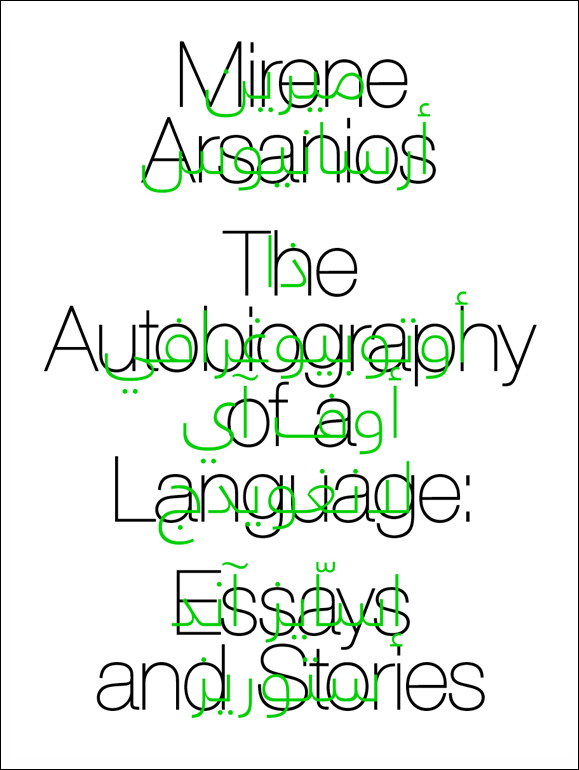The Autobiography of a Language: Essays and Stories
Mirene Arsanios
Praise for Autobiography of a Language
Here the mirror image of the almost hallucinatory, heart-rending loss of the familiar is literary defamiliarization. Arsanios both mourns and blasts apart the notion of the mother tongue, reminding us that for each “mother tongue” at least another tongue is silenced. Desire propels her genre-defying writing, which grief notwithstanding still manages to tongue languages, and that is her genius.
— Mónica de la Torre
A language wants to live, to claim kin beyond the bounds of blood and soil. Diving into the wreck of filiation, it recovers a story in fragments — an autobiography that shelters other lives while probing its own syntax of bereavement. Mirene Arsanios’s finely sculpted prose is fiercely situated. With devastating candor, it draws us into a thinking process that lays bare some crucial articulations of the present: the transactional nature of care, the relation between language and sex, the space between mourning and giving birth, what class does to the body, and what grammar is unable to accommodate. Between remembrance and dreamwork, every passage brims with exhilarating detail. This is some heady, magical materialism.
— Omar Berrada
What if one’s mother tongue is but a crushed tower of Babel? From which of its ruined fragments can a literary voice emerge? The Autobiography of a Language neither assembles a life story nor seeks a fashionable hybrid identity. Rather, through traces of languages in motion, the author captures the guilt of being a writer more than a mother’s daughter, the intersections between mourning a father and giving birth to a son. In brilliant prose, Mirene Arsanios formulates a new mother language despite the absence of a mother tongue, one capable of both love and cruelty.
— Iman Mersal
About the Author
Mirene Arsanios is the author of the short story collection The City Outside the Sentence (Ashkal Alwan). She has contributed essays and short stories to e-flux journal, Vida, The Brooklyn Rail, The Rumpus, and Guernica, among others. Arsanios co-founded the collective 98weeks Research Project in Beirut and is the founding editor of Makhzin, a bilingual English/Arabic magazine for innovative writing. She teaches at Pratt Institute and holds an MFA in Writing from the Milton Avery Graduate School for the Arts at Bard College. Arsanios currently lives in New York where she was a 2016 LMCC Workspace fellow, and an ART OMI resident in fall 2017. With Rachel Valinsky, she coordinated the Friday night reading series at the Poetry Project from 2017–19.
Links
Watch Mirene Arsanios & Laura Jaramillo read at their Double Book Launch at Artists Space, NY, Oct. 12, 2022
“Anatomies of Languages Lost and Found”, E-Flux Criticism
Alisha Mascarenhas reviews The Autobiography for The Poetry Project #271
Author Website
Praise for Autobiography of a Language
Here the mirror image of the almost hallucinatory, heart-rending loss of the familiar is literary defamiliarization. Arsanios both mourns and blasts apart the notion of the mother tongue, reminding us that for each “mother tongue” at least another tongue is silenced. Desire propels her genre-defying writing, which grief notwithstanding still manages to tongue languages, and that is her genius.
— Mónica de la Torre
A language wants to live, to claim kin beyond the bounds of blood and soil. Diving into the wreck of filiation, it recovers a story in fragments — an autobiography that shelters other lives while probing its own syntax of bereavement. Mirene Arsanios’s finely sculpted prose is fiercely situated. With devastating candor, it draws us into a thinking process that lays bare some crucial articulations of the present: the transactional nature of care, the relation between language and sex, the space between mourning and giving birth, what class does to the body, and what grammar is unable to accommodate. Between remembrance and dreamwork, every passage brims with exhilarating detail. This is some heady, magical materialism.
— Omar Berrada
What if one’s mother tongue is but a crushed tower of Babel? From which of its ruined fragments can a literary voice emerge? The Autobiography of a Language neither assembles a life story nor seeks a fashionable hybrid identity. Rather, through traces of languages in motion, the author captures the guilt of being a writer more than a mother’s daughter, the intersections between mourning a father and giving birth to a son. In brilliant prose, Mirene Arsanios formulates a new mother language despite the absence of a mother tongue, one capable of both love and cruelty.
— Iman Mersal
About the Author
Mirene Arsanios is the author of the short story collection The City Outside the Sentence (Ashkal Alwan). She has contributed essays and short stories to e-flux journal, Vida, The Brooklyn Rail, The Rumpus, and Guernica, among others. Arsanios co-founded the collective 98weeks Research Project in Beirut and is the founding editor of Makhzin, a bilingual English/Arabic magazine for innovative writing. She teaches at Pratt Institute and holds an MFA in Writing from the Milton Avery Graduate School for the Arts at Bard College. Arsanios currently lives in New York where she was a 2016 LMCC Workspace fellow, and an ART OMI resident in fall 2017. With Rachel Valinsky, she coordinated the Friday night reading series at the Poetry Project from 2017–19.
Links
Watch Mirene Arsanios & Laura Jaramillo read at their Double Book Launch at Artists Space, NY, Oct. 12, 2022
“Anatomies of Languages Lost and Found”, E-Flux Criticism
Alisha Mascarenhas reviews The Autobiography for The Poetry Project #271
Author Website

